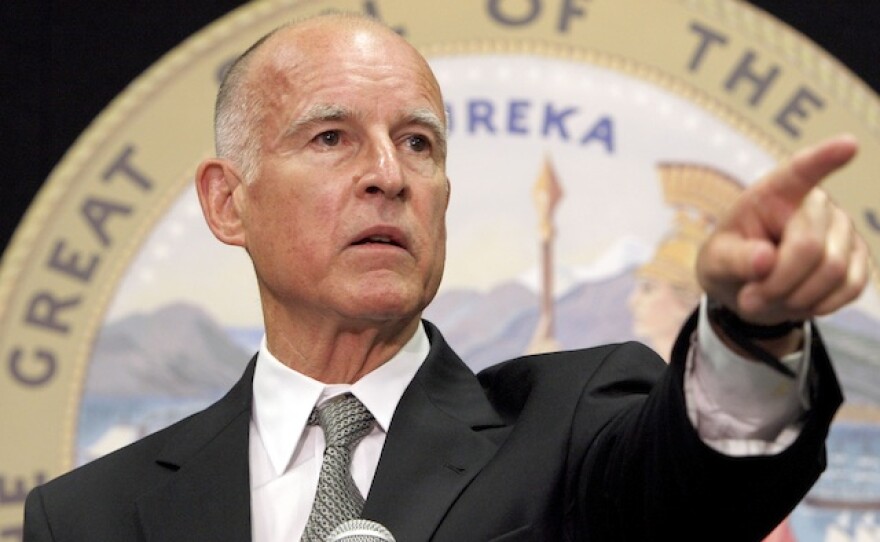.@JerryBrownGov will face @neelkashkari in November #cagov runoff. @electdonnelly called Kashkari to concede a short time ago.
— Ben Adler (@adlerben) June 4, 2014Gov. Jerry Brown easily advanced to the November general election to seek an unprecedented fourth term, where he will face moderate first-time candidate Neel Kashkari, a former U.S. Treasury official who pitched himself as the best candidate to rebrand the struggling California Republican Party.
The GOP race between Kashkari and his Republican rival, conservative Assemblyman Tim Donnelly, became a proxy fight for the future of the GOP in a state that overwhelmingly leans Democratic and voters have given Brown high approval ratings.
Establishment GOP leaders rallied around Kashkari's candidacy, and the 40-year-old former Goldman Sachs banker poured $2 million of his own money into the race in the final weeks as polls showed him trailing Donnelly, a tea party favorite.
"Beginning tonight, Republicans must come together, support one another and focus our energy on changing Sacramento," Kashkari said in a statement early Wednesday after Donnelly called to concede the race. "My commitment is to rebuilding California's middle class and re-energizing the Republican Party."
Brown finished first based on early returns Tuesday night, and told reporters outside the historic governor's mansion in Sacramento, "I take nothing for granted" in November.
"At this point, 40 years from the time I won my first primary for governor of California, I'm ready to tackle problems, not on a partisan basis, but on the long-term basis of building California and making sure we're ready for the future," said Brown, who is 76.
Brown has pursued a pragmatic approach since returning to the governor's office in 2011 after serving from 1975-1983. He won praise for helping to close a multibillion-dollar state budget deficit and persuading voters to approve temporary sales and income tax increases, allowing the Democratically controlled Legislature to funnel more money to public schools.
Meanwhile, Donnelly and Kashkari offered competing visions for the struggling GOP. Donnelly is a social conservative who supports expanding gun rights and restricting immigration and worried some of the Republican establishment with his heated rhetoric; Kashkari, a son of Indian immigrants who is a social libertarian and fiscal conservative, has focused on rebuilding the middle class.
The governor's race was the most high profile on Tuesday's primary ballot. There were also opportunities for the GOP to make small gains in an overwhelmingly Democratic state.
But the first statewide test for a nonpartisan candidate in the top-two primary system yielded a convention outcome, with Republican Pete Peterson, an academic, and state Sen. Alex Padilla, a Democrat, advancing in a crowded race for secretary of state, the office that oversees voting and campaign finance. Independent Dan Schnur, a University of Southern California lecturer, had hoped to make history.
Tuesday's primary also set the stage for several fiercely contested congressional races in the fall.
Republicans are targeting four congressional Democrats this year: Reps. Ami Bera from the Sacramento area; Raul Ruiz from the Coachella Valley; Scott Peters from San Diego; and Julia Brownley of Ventura County.
Democrats have targeted Republican Rep. David Valadao in the San Joaquin Valley, where he will face Amanda Renteria, a Democratic daughter of an immigrant farmworker; and hope to win the Inland Empire seat of retiring Republican Rep. Gary Miller. Iraq War veteran and security consultant Paul Chabot, a Republican, advanced to the runoff in that seat, while several candidates were dueling for second place.
In the heart of the Silicon Valley, seven-term Democratic Rep. Mike Honda faces a challenge from upstart Ro Khanna, a fellow Democrat who advanced Tuesday.
Honda and Republican Rep. Tom McClintock, who represents Sierra foothill communities in the northern and central parts of the state, could face strong challenges from within their own party in the general election.
Californians also approved two ballot measures: Proposition 41, which authorizes $600 million for affordable housing for veterans, and Proposition 42, which enshrines local government compliance with the state's open records and public meetings laws.
Voters in Del Norte rejected a measure to join four other counties pursuing a 51st state to be named Jefferson, while an identical measure in Tehama County remained too close to call. Lake County voters appeared to support overturning county limitations on marijuana growing operations.







